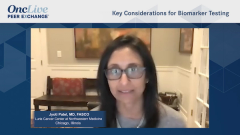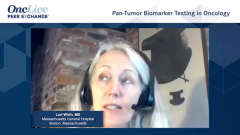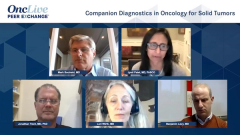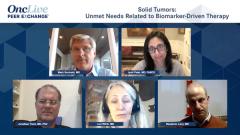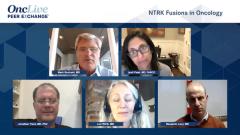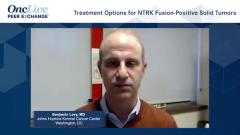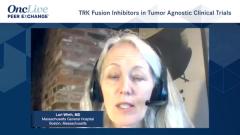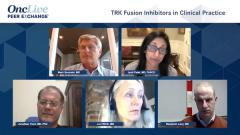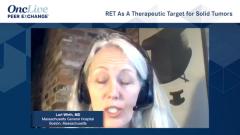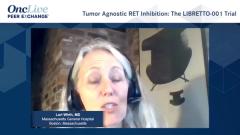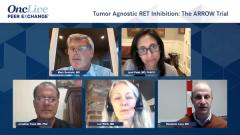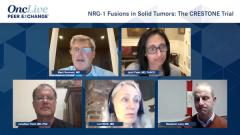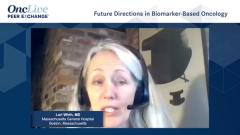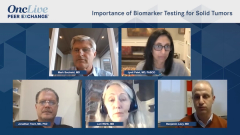
Solid Tumors: Unmet Needs Related to Biomarker-Driven Therapy
Dr Mark Socinski and panel discuss the challenges and unmet meets of biomarker-driven therapy across solid tumor types.
Episodes in this series

Mark Socinski, MD: Let’s close this session by talking about some of the unmet needs regarding biomarker-driven therapies in oncology. I’ll start with Jonathan to get his view of the challenges in this area.
Jonathan Trent, MD, PhD: I agree with everyone. There are still plenty of unmet needs in relation to biomarkers. In cases where patients have sarcoma, we have looked at circulating tumor DNA [ctDNA] platforms and their ability to detect minimal disease in patients who are progressing, or even before they on CT scan. In patients with sarcoma, the circulating tumor DNA to detect progression prior to a CT scan or MRI is just not there. I would love to see a blood-based biomarker assay that was more sensitive than a CT scan, an MRI, or a PET [positron emission tomography] scan.
Mark Socinski, MD: Do you think we have that in front of us? I have often made the statement. We used to have a saying when I was in North Carolina: Don’t go looking for trouble until trouble comes looking for you. If you had a highly effective therapy that you were willing to transition to at a very early time point, that might be the case. The important aspect is to really prove the clinical utility of knowing that before you see resist progression.
Remember that, at least currently, all our criteria that we use in evaluating cancer therapy is focused on resist criteria. Maybe someday ctDNA will play a role in that, and maybe a PET scan will play a role in that. I do not know how you feel about PET scans, Jonathan, but I think they are 1 of the most overutilized modalities in cancer therapy. In treating lung cancer, where details of the chest CT are so important to decide on treatments, it is a really terrible-quality chest CT, even if we have a dedicated chest CT. Ben, what unmet needs are in this area?
Benjamin Levy, MD: I would say a couple of things are unmet needs. One is we need to remember that, despite all this alteration in the diagnostic algorithm we have for patients, patients continue to be woefully undergenotyped in the community. Paper after paper has shown missed alterations, and not everyone is getting complete molecular testing. That is 1 unmet need. We still need to get the word out.
We need to understand this has a lot to do with—there are many factors. Tissue may be insufficient. There is tissue heterogeneity. It is sending it to the right platform. All are important. Then there is the importance of liquid. We all may have a hard time finding a good interventional radiologist or pulmonologist, but we all know a good phlebotomist. It’s not that difficult to get 10 cc of blood and the turnaround time is pretty rapid. That is 1.
Second, we need to remember the pie is filling in for those with lung cancer with KRAS G12C mutations and those who are positive for HER2 [human epidermal growth factor receptor 2]. Now we have all these alterations. Remember, we still have a big slice of that pie—perhaps a slice the size of a New York City slice of pie—that is still unknown. We do not know what the genome type is, and that is a call to better understand tumor biology outside the other alterations that we already know.
Mark Socinski, MD: Your point about a clear unmet need relates to undertesting. We see this time and again, at least when treating lung cancer. The patients do not get a full coverage of all the things for which there are FDA-approved targeted therapies.
Lori Wirth, MD: Mark, let me just point out that is the case for treating lung cancer, where ASCO [American Society of Clinical Oncology] Clinical Practice Guidelines recommend testing quite strongly. Think about the other tumor types and how many more patients are not being tested.
Mark Socinski, MD: Is that a theme in your world, Lori?
Lori Wirth, MD: Yes, absolutely.
Mark Socinski, MD: I guess I should ask Jonathan too. In the sarcoma world, is undertesting an issue?
Jonathan Trent, MD, PhD: It is a huge issue. For instance, our patients with GI [gastrointestinal] stromal tumors—70% of them have a KIT mutation, for which we have a drug. The other 30% of patients are treated with a different drug, so 30% of our patients are predicted to be resistant to imatinib. Yet regarding patients with metastatic GISTs [gastrointestinal stromal tumors], according to the National Cancer Database, only 30% are undergoing any type of NGS [next-generation sequencing] or mutation analysis. Seventy percent of these patients are just being treated blindly. Some of these patients are treated with adjuvant therapy for 3 years. It is a really undermet need.
Mark Socinski, MD: Jyoti, do you have any thoughts on unmet needs?
Jyoti Patel, MD, FASCO: Mine is a really practical 1. It revolves around understanding how we can better communicate results to providers. Often, we do not test, but hopefully education will help with some of that. As we send testing out, how do we incorporate results in an EMR [electronic medical record], so people know it’s actionable?
That other piece is just about a health system buying into the communication and infrastructure to make it as important as the initial histologic diagnosis. This is really the definer of the population. Team dynamics and education are very important. It is not just the physician. It is really that everyone on the team understands the importance of this send-out lab to what you are doing for the patient in front of you.
Mark Socinski, MD: I have always taught people I train that there are 2 things you absolutely have to get right for every patient with cancer. That is the stage and the diagnosis. In 2021, the diagnosis includes a comprehensive molecular panel because we have some highly effective therapies that we do not have access to unless you make the diagnosis. We can then transition to that therapy. We need to stress the education of these sorts of things. There really should not be a patient who is undertested, even though we all know that that really does happen on a basis that is far too frequent than what we would like.
I would like to believe in our practices, and that the people in this webinar do not undertest. We go to great lengths, even if we have to do another biopsy or plasma-based things. Remember the comment about plasma? In my opinion, it is helpful only if you find something, so there could be issues of sensitivity with the plasma. You have to go the extra mile if you do not think your test is reliable enough, particularly in our population of patients who never smoked. Sometimes a second biopsy is indicated to make sure you are not missing a driver.
TRANSCRIPT EDITED FOR CLARITY


